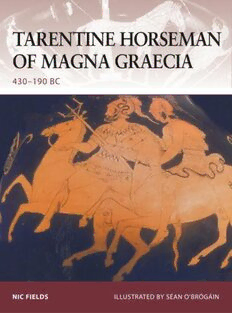
Tarentine Horseman of Magna Graecia: 430-190 BC (Warrior) PDF
69 Pages·2008·25.786 MB·English
Most books are stored in the elastic cloud where traffic is expensive. For this reason, we have a limit on daily download.
Preview Tarentine Horseman of Magna Graecia: 430-190 BC (Warrior)
Description:
This is a slim but very informative volume on ancient Greek horsemen with special reference to the cavalry of Taras in southern Italy. It should be noted that there is a notable lack of reference material (both writeen and pictorial) on Tarantine horsemen themselves, thus the bulk of the discussion here is actually applicable to most Grecian riders of the Hellenic and Hellentistic periods. Also, due to its brevity, this effort is not an adequate replacement for more comprehensive studies like those of Spence[[ASIN:0198150288 The Cavalry of Classical Greece: A Social and Military History with Particular Reference to Athens (Clarendon Paperbacks)], Worley [[ASIN:0813318041 Hippeis: The Cavalry of Ancient Greece (History and Warfare)], or Gaebel [ASIN:0806134445 Cavalry Operations in the Ancient Greek World]. All the same, there are more than enough fresh insights and new material here to make this a worthy supplement to those much longer works.
My quibbles on the content are as follows: First, the brief discussion of Macedonian cavalry battle included (p. 51) appears to derive (perhaps indirectly) from oft repeated but badly flawed concepts of J.F.C. Fuller [ASIN:0306813300 The Generalship Of Alexander The Great]. These originated as a way for Fuller to cite historical roots for his equally faulty theories on armored warfare (a great discussion of whose shortcomings can be found in ASIN:0060009772 The Blitzkrieg Myth: How Hitler and the Allies Misread the Strategic Realities of World War II). Indeed, tactical data cited elsewhere by Fields in this very volume also contradict Fuller's theories. Second, Fields cites a Tarantine aristocratic horse militia of 1,000 riders in the mid-5th century B.C. (p. 20). Yet this comes from an estimate by Strabo for Taras' maximum strength in the mid-4th century B.C. In the mid-5th century, Taras had barely recovered from a catastrophic defeat against the Iapyians in 473 B.C. and must have still fielded but a modest mounted force. In fact, extensive expansion of the previlaged horse-owning class would have come only after considerable economic growth through acquisition of new territory. This probably began with Taras' victory over neighboring Thurii in 440 B.C. and didn't reach 1,000 rider proportions until late in the early 4th century at best. Finally, it seems unlikely that the first mention of Tarantine horsemen (in 317 B.C. as cited by Fields on p. 14) actually refers to riders from Taras itself. These men are operating in Asia Minor and it's hard to justify their importation all the way from Italy. It's more believable that these were Greek riders of closer origin that fought in a manner similar to the Tarantines (i.e. using shields). Greek mercenaries fighting for Taras in the period 343-331 B.C. had likely brought this highly effective style eastward (at least to Greece and, perhaps, as far as Asia Minor). Thus, the term "Tarantine" had probably already come to denote a certain type of horseman rather than a nationality (Fields accepts this for the end of the Third century and admits it might have occured much earlier).
Please note that the foregoing comments might seem highly critical, but these are really very minor points. Overall, I consider this study to be a fine addition to my own library and a valuable asset to better understanding the role of Greek horsemen in general and their Tarantine variants in particular.
See more
The list of books you might like
Most books are stored in the elastic cloud where traffic is expensive. For this reason, we have a limit on daily download.
